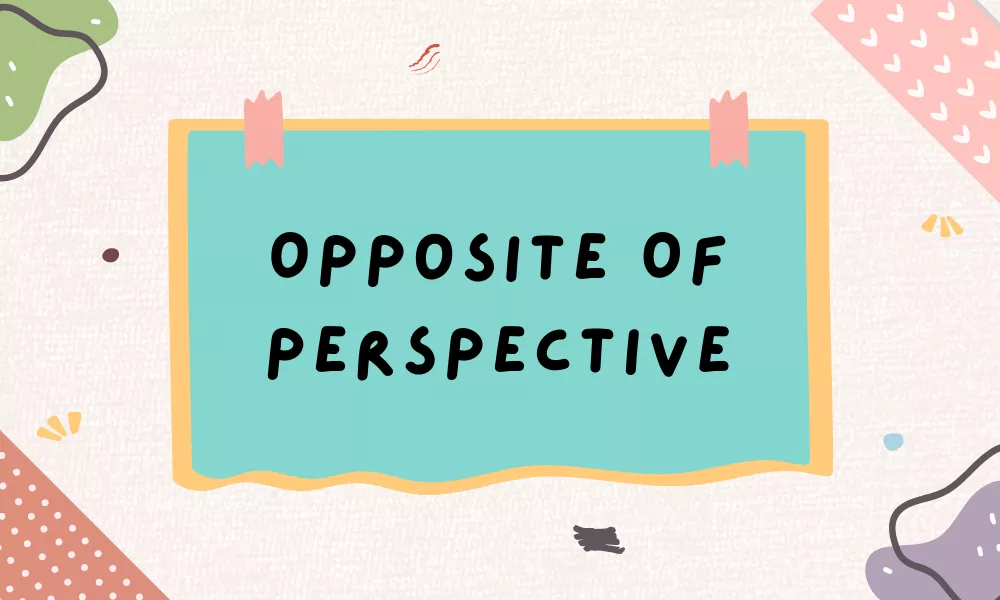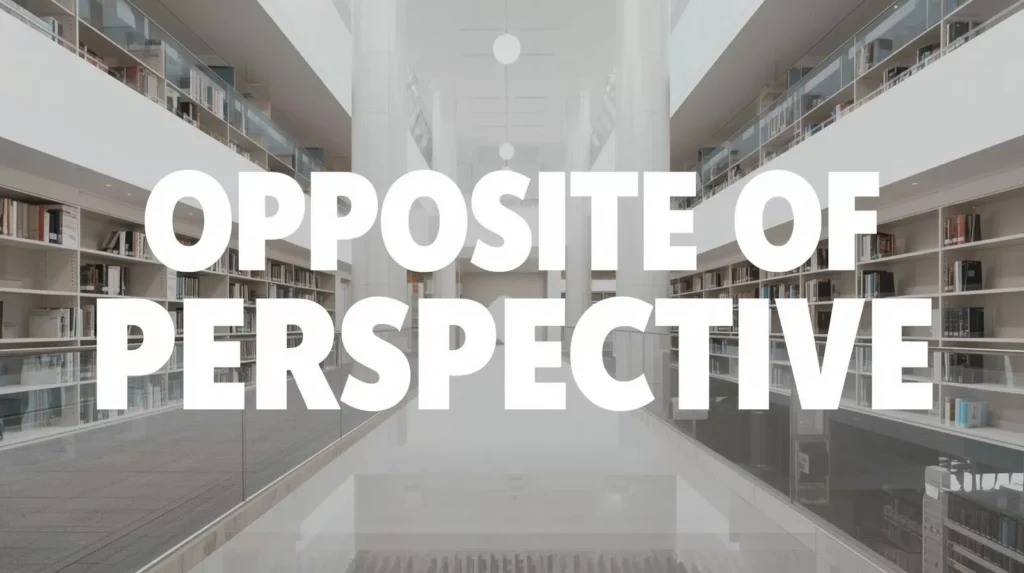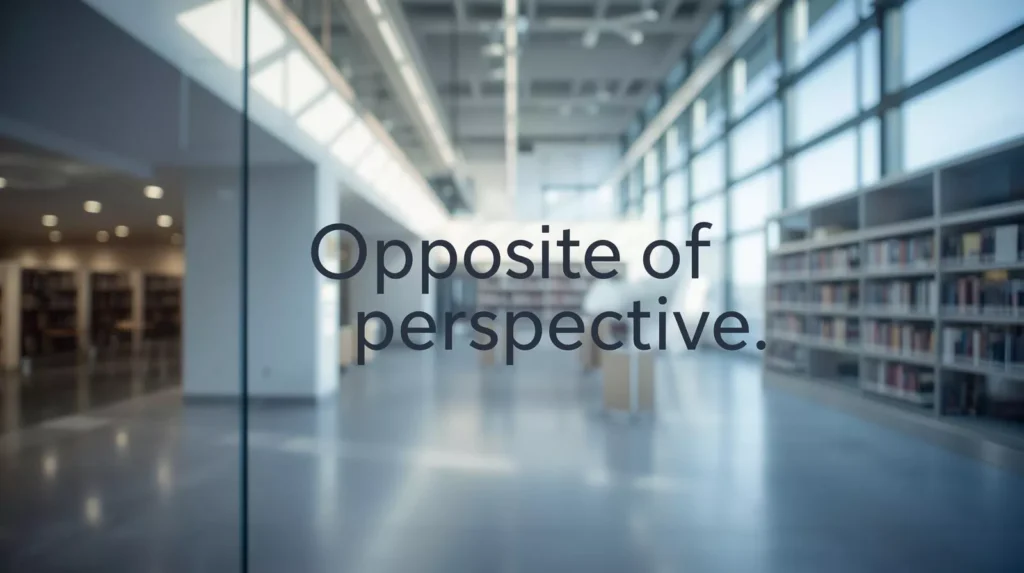Opposite of Perspective – Meaning, Antonyms, and Examples Explained

The word perspective refers to the way we see, interpret, and understand the world around us. It influences how we think, communicate, and solve problems. However, when someone lacks this broader viewpoint or fails to understand different sides of a situation, we turn to the antonyms of perspective. Words like ignorance, bias, narrow-mindedness, misunderstanding, and shortsightedness describe the absence of open-mindedness or clear insight. Exploring these opposites helps us recognize what happens when understanding is limited, encouraging more thoughtful and empathetic communication in both personal and social contexts.
Meaning of Perspective
Perspective means a particular way of seeing or understanding something. It’s your viewpoint or outlook that shapes how you interpret events, make decisions, and relate to others. In art, it refers to how objects appear in relation to each other, while in life, it reflects your mindset or approach toward situations and people.

Why Knowing the Opposite of Perspective Matters
Understanding the opposite of perspective helps identify when thinking becomes limited, biased, or unclear. Recognizing words like ignorance, narrow-mindedness, or misunderstanding allows you to describe situations where people fail to see the bigger picture. This awareness promotes open-mindedness, empathy, and better communication by reminding us of the value of diverse viewpoints.
Antonyms of Perspective with Meaning And Example
- Ignorance – Lack of knowledge or awareness.
Example: His ignorance of other cultures made him quick to judge. - Bias – An unfair preference or prejudice toward one side.
Example: Her bias prevented her from seeing the issue objectively. - Narrow-mindedness – Unwillingness to consider other ideas or beliefs.
Example: His narrow-mindedness stopped him from understanding different opinions. - Prejudice – A preconceived opinion not based on reason or experience.
Example: Prejudice often clouds a person’s ability to see multiple perspectives. - Misunderstanding – Failure to grasp the true meaning of something.
Example: The argument began because of a simple misunderstanding. - Shortsightedness – Lack of foresight; inability to see beyond the present.
Example: Their shortsightedness caused them to ignore long-term consequences. - Dogmatism – Stubborn belief in one’s own opinions as absolute truth.
Example: His dogmatism left no room for fresh ideas or debate. - Confusion – Lack of clarity or understanding.
Example: The sudden change in policy created confusion among employees. - Unawareness – Not being conscious or informed about something.
Example: Her unawareness of the situation made her comments seem insensitive. - Tunnel Vision – Focus on one aspect while ignoring the bigger picture.
Example: His tunnel vision prevented him from seeing alternative solutions. - Myopia – Figuratively, a failure to consider broader implications.
Example: The company’s myopia led to poor long-term planning. - Rigidity – Inability to adapt or accept new perspectives.
Example: Her rigidity made teamwork challenging. - Intolerance – Unwillingness to accept different opinions or behaviors.
Example: Intolerance of others’ beliefs can lead to conflict. - Close-mindedness – Reluctance to explore new viewpoints.
Example: His close-mindedness made every discussion one-sided. - Oblivion – The state of being unaware or unconscious of what is happening.
Example: He lived in oblivion, ignoring the realities around him.
Emotional Antonyms of Perspective
| Antonym | Meaning | Example |
|---|---|---|
| Indifference | Lack of interest or concern. | Her indifference to others’ struggles showed no emotional perspective. |
| Arrogance | Overconfidence that dismisses others’ viewpoints. | His arrogance blinded him to valuable advice. |
| Resentment | Holding negative emotions without understanding others’ motives. | Resentment grew because he never tried to see her perspective. |
| Self-centeredness | Focus solely on one’s own emotions or needs. | Self-centeredness prevents genuine empathy. |
| Bitterness | Deep anger that distorts perception. | His bitterness made him view every situation negatively. |
| Denial | Refusal to accept reality or another viewpoint. | Her denial of the problem stopped her from seeing solutions. |
| Hostility | Strong opposition or dislike toward others. | His hostility made understanding impossible. |
| Egotism | Excessive focus on self-importance. | Egotism clouds one’s ability to see another side. |
| Jealousy | Emotional insecurity leading to distorted perception. | Jealousy made him misinterpret every friendly gesture. |
| Apathy | Emotional emptiness or lack of reaction. | Her apathy toward world issues showed a lack of perspective. |
Behavioral Antonyms of Perspective
- Stubbornness – Refusal to change one’s mind or behavior.
Example: His stubbornness made every discussion frustrating. - Impatience – Unwillingness to wait or understand fully.
Example: Impatience kept her from seeing the bigger picture. - Conceit – Excessive pride that blocks self-reflection.
Example: Conceit made him think his opinion was always right. - Reactivity – Acting without reflection or understanding.
Example: His reactivity caused unnecessary arguments. - Dismissiveness – Rejecting ideas without proper consideration.
Example: Dismissiveness shuts down meaningful dialogue. - Inflexibility – Inability to adjust behavior to new information.
Example: Inflexibility kept the team from adapting to change. - Negligence – Failure to pay attention or care about details.
Example: His negligence of facts led to poor conclusions. - Overconfidence – Excessive belief in one’s own judgment.
Example: Overconfidence made her ignore opposing evidence. - Complacency – A false sense of satisfaction that stops growth.
Example: Complacency prevents you from gaining new insights. - Defensiveness – Responding protectively instead of understanding.
Example: His defensiveness stopped the conversation from progressing.
Contextual Antonyms of Perspective
| Antonym | Meaning | Example |
|---|---|---|
| One-sidedness | Considering only a single aspect of an issue. | The report showed one-sidedness, ignoring opposing views. |
| Parochialism | A narrow or limited outlook based on local interests. | Parochialism kept the committee from embracing new ideas. |
| Partiality | Favoring one view unfairly. | The judge’s partiality undermined the case’s fairness. |
| Obscurity | Lack of clarity or insight. | His ideas were lost in obscurity due to poor reasoning. |
| Misinterpretation | Incorrect understanding of a concept or event. | The message caused trouble due to misinterpretation. |
| Distortion | Twisting facts or perceptions. | Media distortion can alter public understanding. |
| Simplification | Overlooking complexity; reducing ideas too much. | His simplification of the issue ignored key factors. |
| Blindness | Failure to perceive or recognize reality. | Her blindness to others’ feelings hurt her relationships. |
| Misdirection | A focus on the wrong aspects of a situation. | The project failed due to misdirection of priorities. |
| Incomprehension | Inability to grasp or understand. | His incomprehension of the problem made progress impossible. |
Read: Opposite of Calm
Usage Rules for Antonyms of Perspective
- Match the Context Correctly – Always choose an antonym that fits the situation. For example, ignorance suits intellectual contexts, while narrow-mindedness fits emotional or social ones.
- Use Emotional vs. Rational Opposites Wisely – Distinguish between emotional and logical antonyms. Bias reflects flawed reasoning, while resentment reflects emotional distortion.
- Avoid Overlapping Terms – Many antonyms of perspective have subtle differences, don’t use them interchangeably. Confusion and misunderstanding differ: confusion is general, misunderstanding is specific.
- Balance Tone and Formality – Some antonyms sound more formal (dogmatism, myopia), while others are conversational (close-mindedness, shortsightedness). Match your word choice to your writing tone.
- Show Contrast Clearly – When using antonyms in sentences, make the contrast with perspective or viewpoint obvious. This makes your meaning stronger and avoids vagueness.

Common Mistakes When Using Antonyms of Perspective
- Using Literal Instead of Figurative Meanings – Words like blindness or shortsightedness can be physical or metaphorical, ensure they’re used figuratively when referring to mental or social outlooks.
- Overgeneralizing Negative Words – Not every lack of perspective equals ignorance or bias. Use precise antonyms that reflect the actual limitation (emotional, intellectual, or social).
- Ignoring Tone Sensitivity – Harsh antonyms like stupidity or arrogance may sound offensive in formal writing. Choose softer yet accurate words like unawareness or narrow-mindedness.
- Mixing Behavioral and Contextual Terms – Don’t confuse behavioral antonyms (like stubbornness) with conceptual ones (like misinterpretation). Each applies to a different type of limitation.
- Failing to Provide Context or Comparison – Simply listing an antonym (e.g., “He showed ignorance.”) is vague. Add context that highlights the lack of understanding.
Antonyms of Perspective Quiz
Q1. Which word best describes the opposite of having an open and balanced perspective?
A) Insight
B) Ignorance
C) Awareness
D) Understanding
Q2. If someone refuses to accept new ideas or opinions, they are showing:
A) Open-mindedness
B) Empathy
C) Narrow-mindedness
D) Perspective
Q3. When a person only sees one side of an issue and ignores others, this is called:
A) Tunnel vision
B) Wisdom
C) Objectivity
D) Enlightenment
Q4. Which antonym of perspective refers to a lack of understanding or wrong interpretation?
A) Awareness
B) Misunderstanding
C) Curiosity
D) Clarity
Q5. If a person’s judgment is clouded by personal preference or favoritism, it shows:
A) Bias
B) Tolerance
C) Fairness
D) Balance
Q6. What is the opposite of having a long-term, forward-thinking perspective?
A) Foresight
B) Vision
C) Shortsightedness
D) Broad-mindedness
Q7. Someone who cannot accept that others may think differently shows:
A) Flexibility
B) Intolerance
C) Understanding
D) Objectivity
Q8. When thoughts are confused and unclear, which antonym of perspective applies best?
A) Clarity
B) Awareness
C) Confusion
D) Observation
Q9. If a person stubbornly believes they are always right and never listens, they are showing:
A) Dogmatism
B) Insight
C) Awareness
D) Fairness
Q10. What word describes a lack of knowledge or attention to what’s happening around you?
A) Awareness
B) Enlightenment
C) Oblivion
D) Mindfulness
Answer: b,c,a,b,a,c,b,c,a
Read: Opposite of Salutation
Read: Opposite of Challenge
FAQs
Conclusion
Understanding the antonyms of perspective helps you recognize when thinking becomes limited, biased, or unclear. Words like ignorance, narrow-mindedness, bias, and shortsightedness highlight the absence of open-mindedness and critical thinking. By learning these opposites, you can better describe situations where understanding is missing and encourage more thoughtful communication. Whether used in writing, discussion, or self-reflection, knowing the opposite of perspective reminds us of the importance of empathy, awareness, and balanced judgment in every aspect of life.
